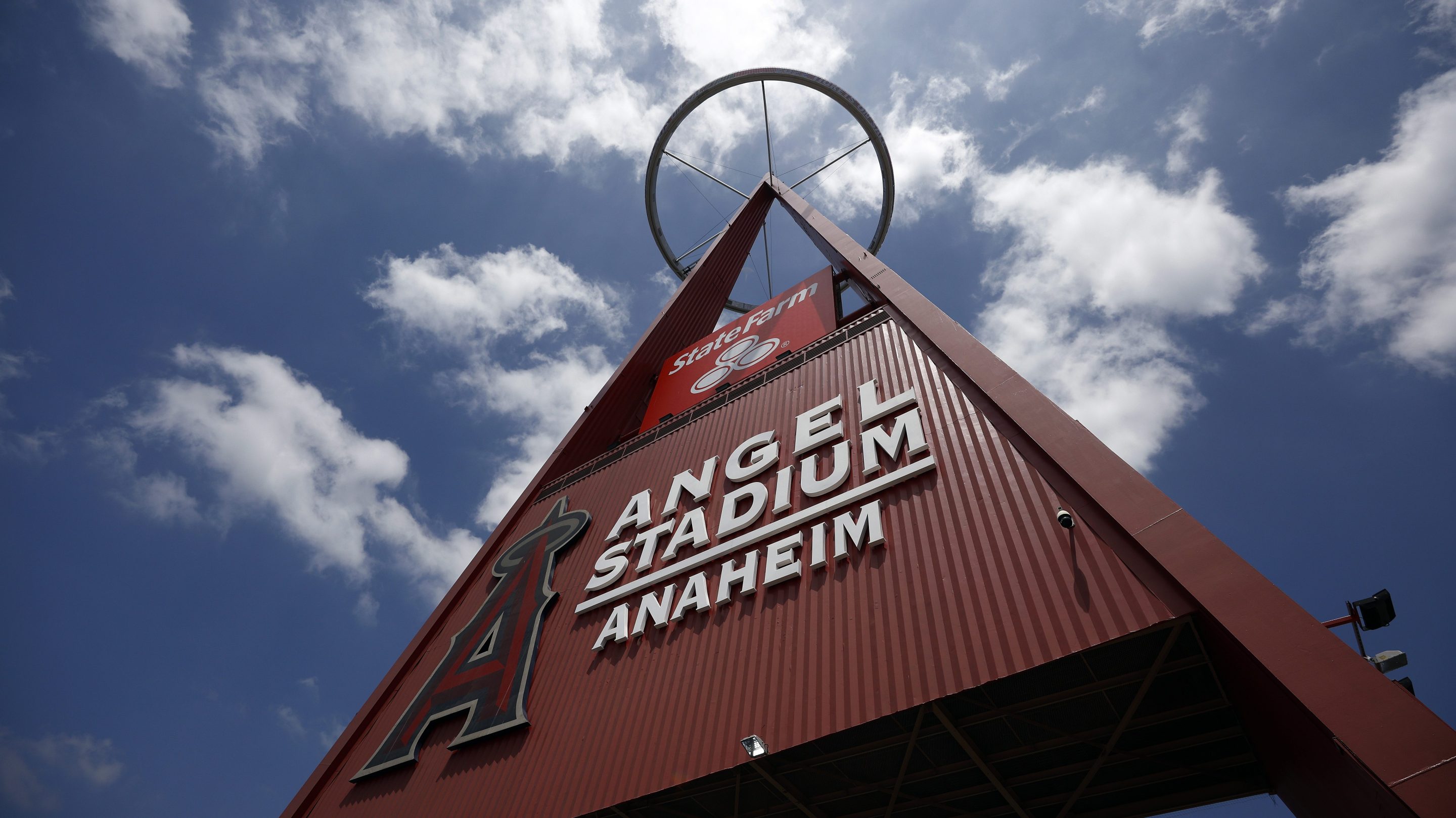On Monday, Anaheim Mayor Harry Sidhu resigned. His resignation came a day after Melahat Rafiei, a state representative to the Democratic National Committee and California Democratic Party secretary, announced her resignation. And the former CEO of the Anaheim Chamber of Commerce, Todd Ament, was charged in federal court with lying about his assets when he tried to purchase a $1.5 million home in Big Bear City. And, yes, this is connected to the Los Angeles Angels' baseball stadium.
This began last week, when a request was filed in Orange County Superior Court by the state attorney general's office. It asked the court to block the sale of the Angels' stadium and its adjacent parking lots from the city of Anaheim to the baseball team's owner, Arte Moreno. Specifically, the request asked the court to stop a settlement between the city and the state that is key to the deal moving forward.
Attached were multiple documents, including a 41-page affidavit from FBI special agent Brian C. Adkins that outlined an investigation into corruption in Anaheim, mostly focused on Sidhu. The first issue the affidavit brings up is Sidhu registering his helicopter in Arizona, not California, in order to avoid paying California state taxes. But that's not what is leading to the resignations. The juicy stuff is found in a later section, titled, "Sidhu Shared Privileged and Confidential Information with the Angels During Stadium Sale Negotiations, Actively Concealed Same from a Grand Jury Inquiry, and Expects to Receive Campaign Contributions as a Result."
There's a lot of details in the affidavit, which was posted online by the Los Angeles Times, but this section pretty much sums up what the FBI agent said happened:
From in or around September 2019, when the City Council was discussing stadium appraisal figures during closed session meetings, until in or around September 2020, when Anaheim and the Angels agreed on terms, including final sale price and community benefits (discussed above), it appears that SIDHU, on at least two specific occasions, provided City-specific information to the Angels for use by the Angels in their negotiations with Anaheim. Furthermore, SIDHU apparently did so in a covert fashion—intentionally concealing his actions from other members of the negotiation team—I believe, in part, to conceal a Brown Act violation and avoid negative public perception.
Back in 2019, the city of Anaheim was renegotiating its lease with the Angels. For years the city had owned the stadium and the parking lots, and then leased them to the club. On Sept. 24, 2019, the city agreed that it would negotiate a sale of the property to Angels owner Arte Moreno's company. That same day, the city council held a closed session to discuss negotiations regarding selling the land and the stadium. A cooperating witness told the FBI that, at the meeting, appraisal figures were discussed. The witness then added that—before the appraisal figures were made public—Sidhu provided them the figures "to be shared with representatives from the Angels," per the affidavit. (The cooperating witness is not identified except for in one transcript portion, in which Sidhu calls him "Todd.")
This was not the only example cited in the affidavit. Adkins also wrote that, on July 21, 2020, Sidhu sent an email to the cooperating witness and the political consultant with the subject line: "4844-8343-9299.2 Key Issues - Stadium Transaction Agreements.docx.” The attached Microsoft Word document appeared to be authored by the law firm Husch Blackwell, which was advising Anaheim on the stadium sale. The political consultant, who was paid by SRB Management—the company through which Moreno wanted to buy the stadium and parking lots—for help with the stadium negotiations, did not disclose this email in his quarterly lobbying reports, Adkins wrote.
Why would Sidhu be helping the Angels rather than the city he was elected to represent? One motive suggested by the events laid out in the affidavit is campaign contributions.
In a recorded, in-person conversation on Oct. 29, 2021, Sidhu told the cooperating witness, as written in the affidavit: "And here’s the thing, if the Angels deal goes through, by the end of the year, then I’m gonna ask ah, [Angels Representative 1]. Right? I’ll just call [Angels Representative 1] up and say, '[Angels Representative 1], we need, we need at least half a million dollars of support for you to come with the IEs'." (IEs, per the affidavit, refers to "independent expenditures.")
At a second meeting between the witness and Sidhu, again in person, on Dec. 6, 2021, Sidhu once again brought up campaign contributions. He said, per the affidavit: "Because I, I’ve said, you gotta at least, minimum of a million dollars to come up with my election. They have to. And of course, you know, if Disney, I mean, if Angels [stadium sale] would conclude next year is approved hopefully, we’ll push for them at least have a million dollars. You know, for [Angels Representative 1] to say 'no' is bad, for them not to say no on that."
Sidhu brought up these contributions to the cooperating witness a third time on Jan. 24 of this year, but the call was not recorded due to a "technical malfunction," the affidavit said. However, the cooperating witness told the FBI that Sidhu had told him that he intended to "revise his request to Angels Representative 1 for campaign contributions from $500,000 to $1,000,000" and "he needed the stadium deal to go through before he could ask Angels Representative 1 for money."
In between those meetings, the cooperating witness also learned that an Orange County grand jury was also looking into the stadium deal. According to the affidavit, the cooperating witness recorded a conversation that he had with Sidhu in mid-January about the grand jury probe. During the conversation, per the affidavit, Sidhu told the cooperating witness, "It was my private emails on even my text and all that with you, I erased everything." He later asked the cooperating witness to "write down, after your meeting is over, I need you to write those questions down yourself ... because then, then we’ll meet and at least you’ll let me know what happened."
The cooperating witness and Sidhu had yet another recorded phone call on Jan. 28 of this year. In it, Sidhu said, "I am hoping to get at least a million from I’m going to be pushing it. [Angels Representative 1] actually asked me. [Angels Representative 1] said, 'What can I do for your election?' I said, 'Let me finish your deal first, and then we'll talk about that.'"
The FBI had the cooperating witness do one last recorded conversation, in person, with Sidhu. It took place on Feb. 8. Beforehand, the witness was given a document that looked like a federal grand jury subpoena and he was told to tell Sidhu that he had been served (he had not been served). That conversation included this exchange, which is being reproduced here as it appeared in the affidavit:
HS: So the thing is only time that fraud is involved, in my opinion, Todd. That if there’s a money exchanged. Right?CW2: That’s my understanding. I mean, that's what we always said I didn't youknow, with [a former Anaheim employee], you know, I didn't want to hide that we were talking to the Angels and things. Right? [Anaheim Employee 1] knew.HS: Right.CW2: I mean we all work together on all these terms we did and tried to help bring it home. I agree with you but they definitely know of conversations. Know of emails, know of texts. So they for the lawsuit, when with the city thing? Did you ever look at what all they got? And what documents that they pulled off your emails and other people's emails?HS: I, most of the emails, I erased it.
A couple of disclosures: Sidhu has not been charged with a crime. His lawyer gave the LA Times a statement saying his client did not share secret information in return for possible campaign contributions. The Angels are in no way accused of any wrongdoing in the document. As for the former Democratic leader Rafiei's connection, that stems from the fact that she was later identified as another cooperating witness into corruption in Anaheim—one that did not factor much into the specific investigation involving Sidhu, but did lead the agents to Ament and Sidhu
All this corruption does not exist in a vacuum. Here, I'll defer to LA Times columnist Gustavo Arellano, who spent more than a decade writing, then editing at OC Weekly, and knows a thing or two about the history of corruption in Anaheim:
Anaheim is a city that has an ugly, barely used, multimillion-dollar transportation hub because former Assembly Speaker Curt Pringle pushed for it in his dual capacity as Anaheim’s mayor and chair of the California High-Speed Rail Authority back in the 2000s. As mayor pro tem back in 2009, Sidhu voted to give a luxury hotel developer a $76-million-plus tax break; as mayor, the council awarded a $425,000 no-bid contract to the Anaheim Chamber of Commerce at his request barely a year after it spent nearly a quarter-million dollars to help him win the mayor’s seat in 2018.
Even the implementation of district elections in 2016, made possible by Latino activists last decade via a civil lawsuit to increase diversity on the council and hopefully check corporate power in the city, did little to stop this cesspool of cronyism. Will the current allegations finally wake up my fellow Anacrimers?
And yet, perhaps saddest of all, there is even more to this story. Previously, a state housing agency said that the deal between the city and the Angels violated California affordable housing laws. In response, the city brokered a settlement with the state, which the California Department of Housing and Community Development told the Times it still thinks should be rejected. But the management company through which Moreno owns the Angels still sent the city a letter saying, "SRB has met all its obligations and has every expectation that this transaction should move forward, and looks forward to the Council’s final action no later than June 14, 2022.”
What would happen if the city does not meet that deadline was left unsaid. Consider it the ultimate curiosity gap, one into which you can fill all your usual assumptions about how politics really works.
A copy of the court filing is below.






